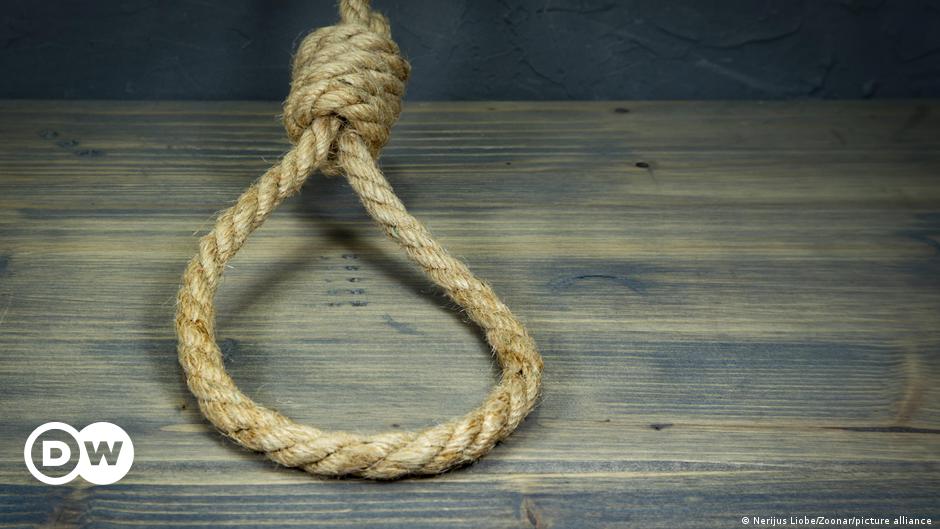
Iran said this week that a court had sentenced to death two female gay rights activists for “spreading corruption on earth” — a charge frequently imposed on people deemed to have broken the country’s Shariah laws.
The country’s official IRNA news agency reported that the two women, Zahra Sedighi Hamedani, 31, and Elham Chobdar, 24, “misused” women and girls in promising better training and job opportunities abroad — a reference to human trafficking.
A revolutionary court in the country’s northwestern city of Urmia, some 600 kilometers (370 miles) northwest of the capital Tehran, handed down the death sentences. The women have the right to appeal.
They were informed of the sentence while in detention in the women’s wing of the Urmia jail.
In a short statement, the Iranian judiciary confirmed that the sentences had been issued.
Anger and frustration at the verdict
Law experts say the charge of spreading corruption on earth is particularly vague and that the provision allows Islamic Revolutionary Courts — which handle cases like corruption on earth, enmity against God and drug trafficking — to abuse their legal powers and gives them a free hand in imposing capital punishment.
The verdict was slammed by foreign-based rights groups and activists.
They described the two women as local gay and lesbian rights activists working for the betterment of the LGBTQ community in the Islamic nation.
Many Iranians living abroad also took to social media to express their anger.
6Rang, an Iranian LGBTQ rights group based in Germany, called the verdict against the two women “unfair and unclear” and part of the regime’s effort to “spread hatred” in society. The group called for increased global pressure on Tehran to free the two women.
Zahra Sedighi Hamedani (l) and Elham Chobdar (r) were sentenced to death by an Iranian court for “spreading corruption on earth”
The fate of Sedighi Hamedani, also known as Sareh, has been a cause for concern for months.
Sareh was arrested in October by Iranian security forces while trying to flee to Turkey after returning to Iran from Iraqi Kurdistan, where she had been based.
Global human rights watchdog Amnesty International said in January the charges against Sareh stemmed from her activism on social media in defense of gay rights.
She also appeared in a BBC documentary aired in May 2021 about the abuses LGBTQ people suffer in the Kurdistan Region of northern Iraq.
She had decided to leave Iraqi Kurdistan after being detained by the regional authorities.
It appears she crossed into Iran again before trying to head for Turkey.
A repressive place for LGBTQ people
In a video clip shared with her friend prior to her arrest, Sareh said she was “about to cross the border to Turkey” since she was afraid her “life is at risk.”
She pointed out that she could be arrested any minute as security forces had identified her and her friends.
“All I wanted was for everyone to know about the pain and suffering the LGBTQ community is enduring in Iran and that we want to be recognized in order to live freely,” she said in the video, shared with 6Rang.
“The journey towards freedom may cost our lives, but we are determined to take it and either live in freedom or die,” she added.
6Rang said Chobdar, the other Iranian woman sentenced to death, owns a wedding boutique in Urumiya and is a friend of Sareh.
According to the rights group, Chobdar used to talk on her Instagram channel about issues affecting LGBTQ people in Iran, and that’s why she was arrested by authorities for “promoting homosexuality.”
Shadi Amin, a coordinator for 6Rang, condemned the death sentences as well as the repression faced by the LGBTQ community in Iran.
Homosexuality is illegal in Iran with its penal code explicitly criminalizing same-sex sexual behavior for both men and women.
The country is considered one of the most repressive places in the world for lesbian, gay, bisexual and transgender people, who face constant threats, intimidation and widespread social stigma.
Iranian President Ebrahim Raisi recently described homosexuality as an “ugly and despicable practice” and said it’s part of a “propaganda campaign by the West” in Muslim countries.
US: Support groups help Iranians embrace LGBTQ identity
Call for global pressure on Iran
Amin told DW that the families of the two women were under enormous pressure not to talk to media about the fate of their loved ones and about the “misconduct and torture” they’re experiencing in prison.
She called on Germany and other foreign governments to put pressure on Iran for the release of the women. Amin stressed that the international community must do more to put an end to the repression of the LGBTQ community in the Middle East nation.
Under Iranian law, crimes such as murder, rape, drug trafficking and sodomy can lead to capital punishment. Iran is second only to China worldwide when it comes to the number of people sentenced to death.
The UN’s independent investigator on human rights in Iran warned last year that the country continues to execute prisoners “at an alarming rate.”
Earlier this year, Iran reportedly executed two gay men on charges of sodomy.
Edited by: Srinivas Mazumdaru







